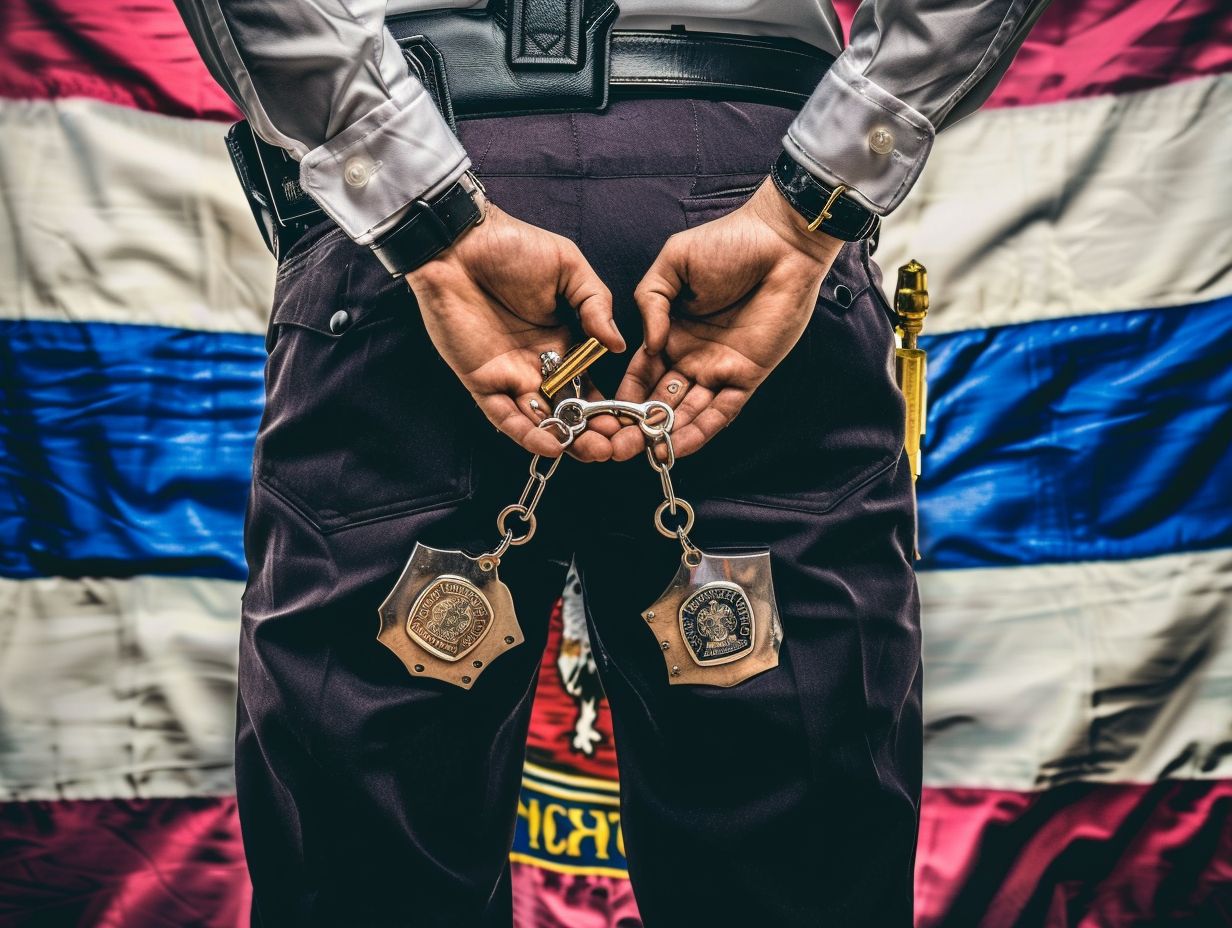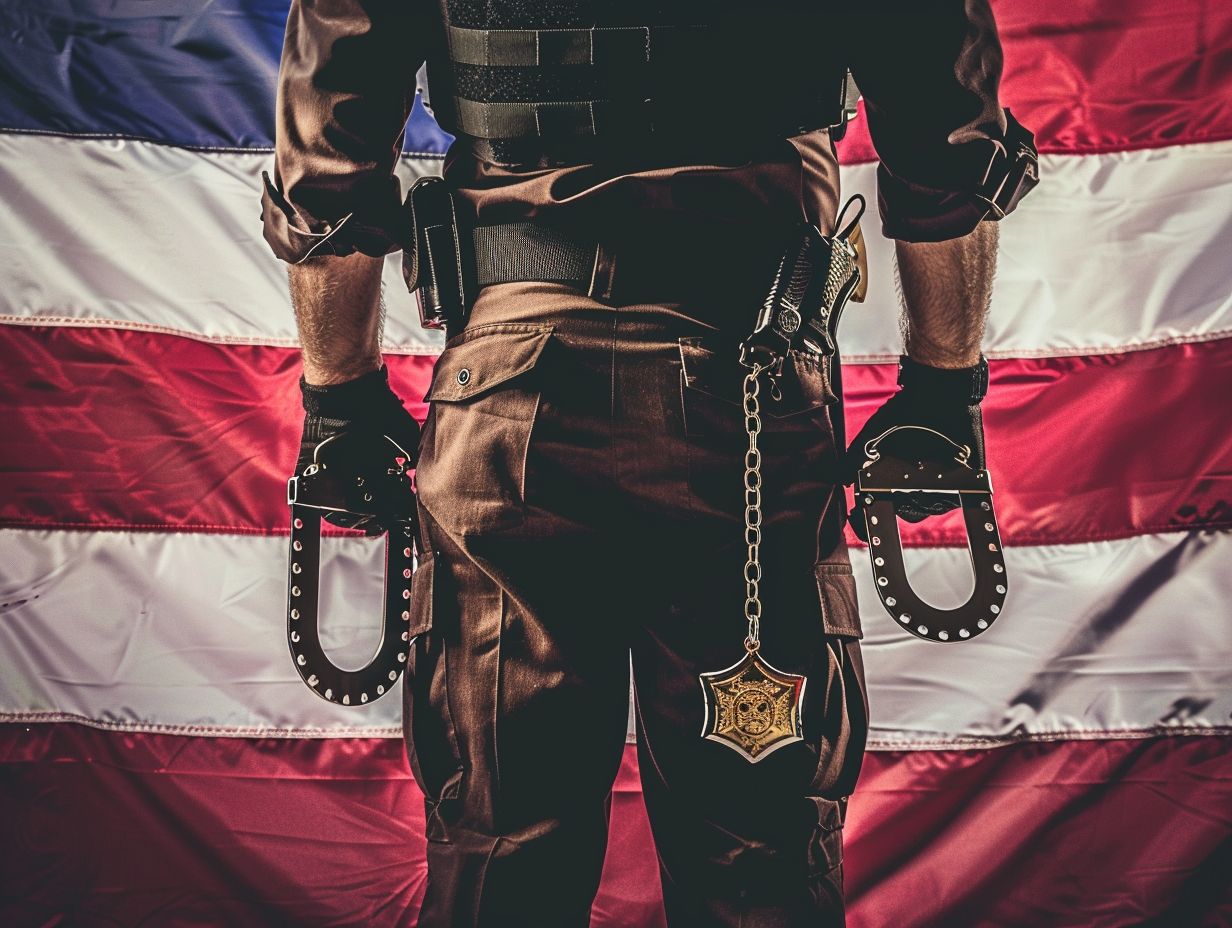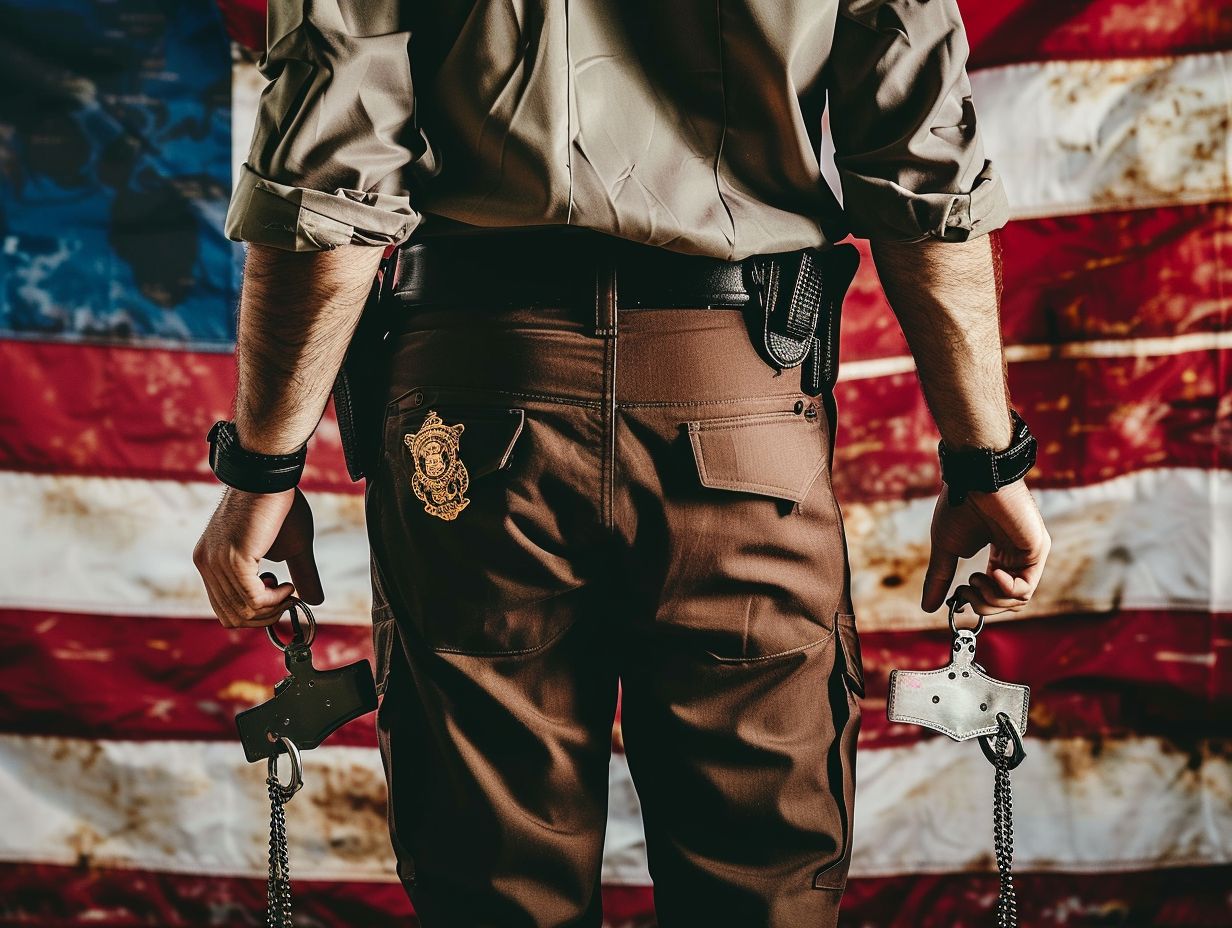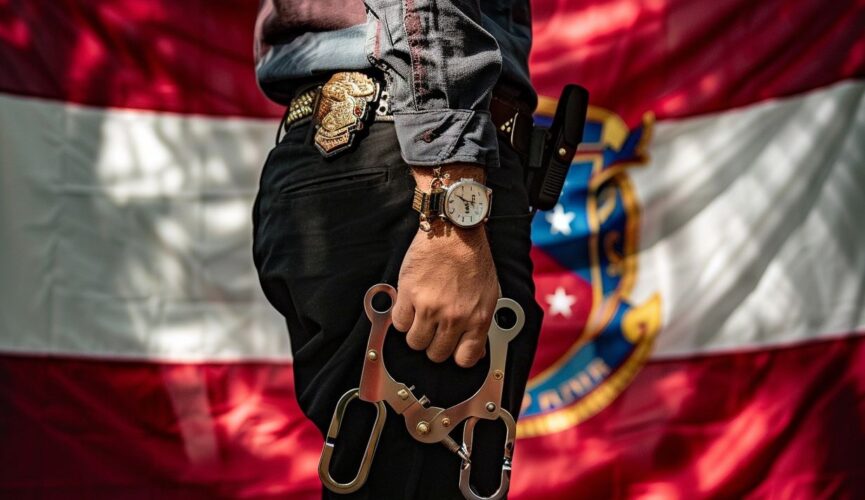Curious about becoming a bounty hunter in Florida? We’ll explore everything you need to know to pursue a career in this exciting field. From the minimum age requirement to the necessary training and licensing process, we’ll cover all the ins and outs of becoming a bounty hunter in the Sunshine State.
You’ll learn about the responsibilities, salary, and job outlook for bounty hunters in Florida. Let’s dive in!
What is a Bounty Hunter?
You know those bounty hunters, right? They go by other names like bail enforcement agents. They’re the ones you call in to hunt down fugitives who decided to skip bail or ghost on their court appearance after making bail.
These folks operate under the bail bonds system, getting those fugitives back into the legal groove.
Their gig is pretty important in the whole legal scene. They help nab individuals who broke the rules of their release. By teaming up with law enforcement and bail bond peeps, bounty hunters put their detecting and surveillance skills to work to find those fugitives and bring them back to the slammer.
This whole fugitive-catching process is key to keeping the bail system in check and making sure those facing criminal charges face up to their responsibilities.
What are the Requirements to Become a Bounty Hunter in Florida?
If you’re looking to become a bounty hunter in Florida, you’ve got to play by the rules laid out in state statutes and regulations. That means getting yourself a valid license, going through the necessary training, and meeting all the qualifications set by the state.
Before you can start hunting down fugitives in Florida, you’ll need to pass a background check to prove you’ve got a squeaky-clean record with no felonies or major offenses. The state won’t take any chances when it comes to bounty hunters—they have to stick to the law and follow strict guidelines for apprehensions and interactions with fugitives. Knowing the legal ins and outs is key, especially in Florida, where there are specific rules governing the bail enforcement process to protect everyone’s rights, from the accused to the bail bondsmen.
What is the Minimum Age Requirement?
If you’re in Florida and thinking about becoming a licensed bounty hunter, you’ll need to be at least 18 years old.
If you meet this age requirement, you can start your journey into the world of bounty hunting by following the specific licensing rules set by the state. The Florida Department of Financial Services is in charge of the licensing process, which involves completing necessary training, passing background checks, and meeting other eligibility criteria. As a budding bounty hunter, you’ll need to show that you can handle responsibilities and operate within the law to keep both yourself and your targets safe. By sticking to these guidelines, you can kickstart your career as a bounty hunter while staying compliant with Florida’s legal standards.
Do You Need a High School Diploma or GED?
If you’re thinking about becoming a bounty hunter in Florida, you’ll need to have a high school diploma or GED to meet the educational requirements for getting licensed.
Having a high school diploma or GED is like the entry ticket for aspiring bounty hunters. It ensures that you’ve got the basics down before diving into the field. This educational standard not only shows that you’re serious about learning but also equips you with important skills like reading, critical thinking, and problem-solving. By getting that diploma or its equivalent, you’re proving that you’re up for the challenge and meeting Florida’s licensing qualifications for this exciting and fast-paced profession.
Do You Need Law Enforcement or Military Experience?
If you’re looking to become a bounty hunter in Florida, having previous law enforcement or military experience can really give you an edge. It’s not always a must-have, but it can bring some valuable skills and insights to the table.
Folks with a background in law enforcement or military training tend to have rock-solid situational awareness, tactical prowess, and experience handling high-pressure situations. These qualities are like gold in the fast-paced and sometimes risky world of bounty hunting. With that kind of background, you might already be a pro at surveillance, investigations, and handling firearms – all key skills for success in this line of work. The discipline, physical fitness, and teamwork drilled into you during your time in law enforcement or the military can seriously level up your game as a bounty hunter.
Do You Need a Background Check?
If you’re looking to become a bounty hunter in Florida, you’ll need to go through a comprehensive background check during the licensing process. This step is essential to make sure you meet all the required qualifications and legal standards.
The background check is a big deal because it confirms your criminal history, ensuring you don’t have any offenses that could put public safety at risk. It also verifies that you’ve completed all the necessary training and certifications as mandated by the state. By thoroughly reviewing your background, authorities can uphold the integrity of the bounty hunting field and ensure everyone follows Florida’s licensing rules.
What Training is Required to Become a Bounty Hunter in Florida?

When you’re training to become a bounty hunter in Florida, you’ll dive into instruction on firearm handling, defensive tactics, physical agility, and other essential skills needed for safe and successful fugitive recovery missions. These training requirements are key to getting you ready to tackle the challenges you’ll encounter out in the field.
Knowing how to handle firearms safely and effectively is crucial since there can be some serious risks involved in capturing fugitives. Learning defensive tactics will arm you with the skills to keep yourself and others safe in high-pressure situations. And don’t forget about the physical fitness training – it’s all about making sure you’ve got the stamina and strength to track down and nab those fugitives like a pro.
Are There Specific Courses or Certifications Needed?
You might need to complete certain courses and certifications if you’re thinking about becoming a bounty hunter in Florida. These programs can really level up your skills in stuff like apprehension techniques, skip tracing, and legal procedures.
These training programs aren’t just about gaining expertise in chasing down fugitives and dealing with legal stuff. They can also help you fine-tune your communication and negotiation skills, which are super important in this line of work.
If you’re aiming to be a bounty hunter, courses focusing on handling weapons and self-defense are key. They’ll give you the training you need to stay safe and follow the rules in potentially risky situations.
Plus, diving into courses about criminal psychology and conflict resolution can be a game-changer. Understanding how fugitives think and learning how to professionally calm down tense situations can really set you apart in the field.
Are There Any Physical Fitness Requirements?
You need to be in top physical shape if you’re a bounty hunter in Florida because the job is no joke. You’ll be doing a lot of running, climbing, and tackling physically challenging tasks.
To track down and capture fugitives effectively, you’ve got to be super agile and have great endurance. The training to become a bounty hunter focuses on building up your strength, speed, and overall fitness. Being able to perform under pressure in all kinds of environments and scenarios is a big part of being successful in this line of work. Meeting specific physical fitness requirements isn’t just about keeping yourself safe but also about nailing those missions where you need to act fast and decisively.
How to Get a Bounty Hunter License in Florida?
To get your hands on a bounty hunter license in Florida, you’ll need to dive into the state’s specific procedures, get all the required documents ready, and make sure you meet the criteria set by the folks in charge.
First off, you need to be at least 18 years old and have a high school diploma or something equivalent. You’ll also have to roll up your sleeves and tackle a state-approved training course covering everything from the laws of the trade to nabbing fugitives and handling firearms safely. And don’t forget the background check – it’s like the bouncer at the door making sure you’re all clear.
After jumping through all those hoops, you’ve gotta take a written exam to show you’ve got what it takes to be a responsible and ethical bounty hunter in the Sunshine State.
What is the Process for Obtaining a License?
When you’re looking to get your bounty hunter license in Florida, the first step usually involves filling out an application, going through some background checks, and meeting specific requirements to show you’re good to go.
Once you’ve sent in your application, you’ll have to wait for the results of your background checks. They want to make sure you don’t have any sketchy criminal history that could disqualify you. It’s super important to give them all the right info and any necessary documents during the application process to speed things up.
If your background check comes back clean, you might still need to meet other state criteria like finishing certain training programs or showing off your skills. Following these rules is key to keep moving forward in the licensing process and snag the approval you need to kickstart your bounty hunter career in Florida.
What Documents are Required?
If you’re looking to get a bounty hunter license in Florida, you’ll need to gather up some specific paperwork. That means rounding up things like your ID, training certificates, and the results of your background check – all to meet the state’s licensing requirements.
These documents are pretty crucial in the application process. They’re there to make sure you measure up to the tough standards set by the state. On top of your ID, you’ll usually have to show proof that you’ve finished a state-approved training program. That’s key to show you’ve got the skills and knowledge needed for the job.
And don’t forget about the background check – it’s a must-have to check if you’re fit for a license. They’ll dig through your past to see if you’ve got any skeletons in your closet, all to make sure only the right folks get the green light to work as bounty hunters in Florida.
What is the Cost of Obtaining a License?

When you’re looking to snag a bounty hunter license in Florida, keep in mind that the cost can vary based on a few factors like application fees, training costs, and other expenses required by the state.
You’ve got to be mindful of the financial side of things when going after that bounty hunter license in Florida. The application fees can be anywhere from $100 to $500, depending on where you’re applying. And don’t forget about the training – that can set you back anywhere from $500 to $2,000. Plus, you’ll need to cover costs for background checks, insurance, and weapon permits, which might add up to a few hundred bucks. Make sure you plan your budget carefully to handle these expenses smoothly and get through the licensing process without a hitch.
What are the Responsibilities of a Bounty Hunter in Florida?
As a bounty hunter in Florida, your duties include working alongside law enforcement agencies, carrying out fugitive recovery operations, and making sure you follow legal procedures and safety measures to catch fugitives effectively.
When you team up with law enforcement in Florida, they provide you with essential info on fugitives, helping you plan successful missions. By sticking to strict legal guidelines, you ensure that all your actions are lawful, protecting the rights of both the fugitive and the public. Safety is key, so proper training, protective gear, and risk assessment are crucial in keeping dangers at bay during apprehensions. This dedication to justice showcases the professionalism and commitment of bounty hunters in Florida.
What is the Role of a Bounty Hunter in the Criminal Justice System?
As someone in Florida, you know how bounty hunters play a crucial role in the criminal justice system. They help nab fugitives, execute warrants, and make sure everything is done by the book when capturing individuals who’ve violated bail conditions.
Their authority comes from the legal system that guides their actions, giving them the go-ahead to track down and capture those who’ve skipped bail or missed their court dates. Bounty hunters are pros when it comes to criminal procedures, and they team up with law enforcement to track down fugitives and bring them to justice.
By sticking to strict rules and regulations, bounty hunters are key players in upholding the legal system’s integrity and ensuring the safety of everyone involved in the pursuit.
What are the Legal Limitations and Regulations for Bounty Hunters in Florida?
When you’re out there hunting bounties in Florida, it’s crucial to play by the rules set by the state laws and regulations. You’ve got to navigate the legal landscape and ethical standards that govern the fugitive recovery processes to ensure you’re on the right side of the law.
In Florida, bounty hunting is no walk in the park – it’s full of high-stakes situations that require you to use your professional judgment wisely. You’ve got to be well-versed in the regulations that control your actions, like knowing when to use force and how to make apprehensions properly.
Keeping things ethical is key. You’ve got to show respect for people’s rights and maintain the integrity of the legal system at all times. By staying up-to-date on the legal dos and don’ts, you can protect not only your own rights but also the rights of those you’re chasing after.
What is the Salary and Job Outlook for Bounty Hunters in Florida?
Your salary and job prospects as a bounty hunter in Florida depend on your experience, connections, and how much people need fugitive recovery services. If you build a solid professional network and stick to ethical standards, you’ll open up more job opportunities and potential for higher earnings.
Seasoned bounty hunters who have a track record of successful captures can charge more for their services, giving them a chance to earn a pretty penny. Keeping up with the latest trends and techniques in fugitive recovery can boost your reputation, making you more attractive to high-paying job offers.
With the demand for skilled bounty hunters on the rise in Florida, those who prove themselves as dependable and effective pros can expect better job security and financial benefits.
What is the Average Salary for Bounty Hunters in Florida?
In Florida, your earnings as a bounty hunter can vary widely, from starting out with entry-level pay to bringing in bigger bucks as you gain experience and expertise. Your salary depends on things like how in-demand your skills are, your personal know-how, and how successful you are at nabbing fugitives.
Market trends really shape how much you can make as a bounty hunter. When demand for bounty hunters is high, salaries go up. If you’re new to the game, you’ll probably start on the lower end of the pay scale, but as you gain experience and build a name for yourself, your earnings will likely go up.
Your skills also come into play. If you’ve got specialized training in things like tactical operations or negotiation, you can expect to rake in more cash for your work. And as you climb the career ladder and build up a solid track record of successful captures, you’ll find yourself earning those top-tier salaries that seasoned bounty hunters command.
What is the Job Outlook for Bounty Hunters in Florida?

Your outlook as a bounty hunter in Florida depends on various factors like industry demand, professional associations, and the need for fugitive recovery services. You’ll find a range of job opportunities working alongside bail bondsmen, law enforcement agencies, and private investigation firms.
As a bounty hunter, your success hinges on forming strong partnerships to track down and capture individuals who have skipped bail. It’s crucial to be part of professional groups like the Florida Bail Agents Association or the National Association of Fugitive Recovery Agents to boost your credibility and expand your network in the field.
To boost your chances in Florida, make sure you keep up with industry trends and actively connect with key players in the industry. This way, you can maximize your employment prospects and build a successful career as a bounty hunter.
Frequently Asked Questions
What are the requirements to become a bounty hunter in Florida?
To become a bounty hunter in Florida, you must be at least 18 years old, have a high school diploma or GED, pass a background check, and complete a state-approved training program.
Do I need a license to become a bounty hunter in Florida?
Yes, you are required to obtain a Class “CC” license from the Florida Department of Agriculture and Consumer Services before you can legally work as a bounty hunter in Florida.
What is the process to obtain a Class “CC” license for bounty hunting in Florida?
The process includes completing a state-approved training program, submitting an application and fingerprints to the Florida Department of Agriculture and Consumer Services, passing a written exam, and paying a fee.
What type of training is required to become a bounty hunter in Florida?
Florida requires a minimum of 40 hours of training, which includes topics such as state laws and regulations, defensive tactics, and firearms training.
Are there any restrictions on bounty hunting in Florida?
Yes, Florida has certain restrictions on bounty hunting, including not being allowed to carry a weapon while making an arrest, not being able to enter a residence without permission, and not being able to use excessive force.
Is there a specific bond required to become a bounty hunter in Florida?
Yes, Florida requires that bounty hunters have a $5,000 surety bond in place to cover any potential damages or losses during their work. This bond must be renewed every two years.

